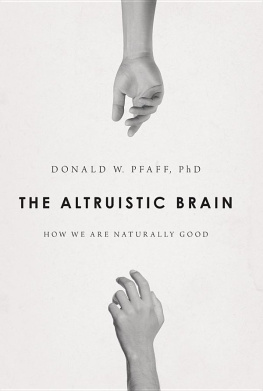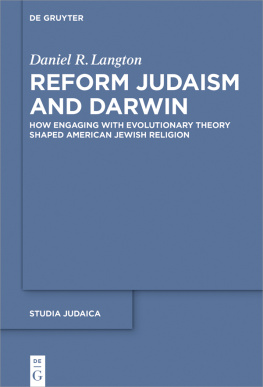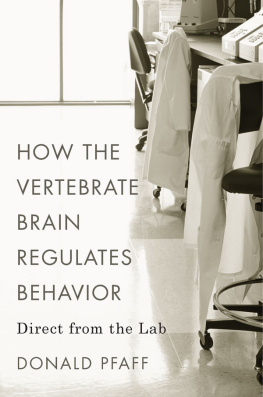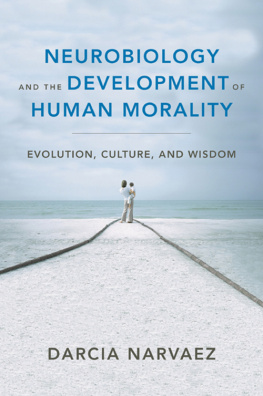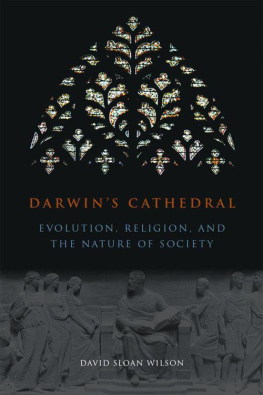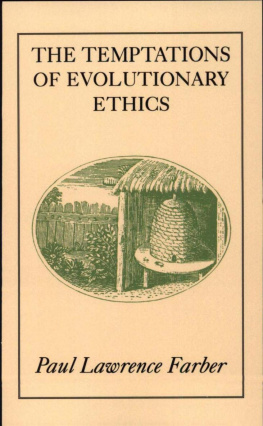THE ALTRUISTIC BRAIN

Oxford University Press is a department of the University of Oxford. It furthers the Universitys objective of excellence in research, scholarship, and education by publishing worldwide.
Oxford New York
Auckland Cape Town Dar es Salaam Hong Kong Karachi
Kuala Lumpur Madrid Melbourne Mexico City Nairobi
New Delhi Shanghai Taipei Toronto
With offices in
Argentina Austria Brazil Chile Czech Republic France Greece
Guatemala Hungary Italy Japan Poland Portugal Singapore
South Korea Switzerland Thailand Turkey Ukraine Vietnam
Oxford is a registered trademark of Oxford University Press
in the UK and certain other countries.
Published in the United States of America by
Oxford University Press
198 Madison Avenue, New York, NY 10016
Oxford University Press 2015
All rights reserved. No part of this publication may be reproduced, stored in a retrieval system, or transmitted, in any form or by any means, without the prior permission in writing of Oxford University Press, or as expressly permitted by law, by license, or under terms agreed with the appropriate reproduction rights organization. Inquiries concerning reproduction outside the scope of the above should be sent to theRights Department, Oxford University Press, at the address above.
You must not circulate this work in any other form
and you must impose this same condition on any acquirer.
Library of Congress Cataloging-in-Publication Data
Pfaff, Donald W., 1939author.
The altruistic brain : how we are naturally good / Donald Pfaff.
p. ; cm.
Includes bibliographical references and index.
ISBN 9780199377466 (alk. paper)
eISBN 9780199377480
[DNLM: 1. Altruism. 2. Brainphysiology. 3. Behaviorphysiology.
4. Biological Evolution. WL 337]
BF637.H4
155.232dc23
2014012452
The science of medicine is a rapidly changing field. As new research and clinical experience broaden our knowledge, changes in treatment and drug therapy occur. The author and publisher of this work have checked with sources believed to be reliable in their efforts to provide information that is accurate and complete, and in accordance with the standards accepted at the time of publication. However, in light of the possibility of human error or changes in the practice of medicine, neither the author, nor the publisher, nor any other party who has been involved in the preparation or publication of this work warrants that the information contained herein is in every respect accurate or complete. Readers are encouraged to confirm the information contained herein with other reliable sources, and are strongly advised to check the product information sheet provided by the pharmaceutical company for each drug they plan to administer.
CONTENTS
PART ONE
EVIDENCE FOR ALTRUISTIC BRAIN THEORY
PART TWO
IMPROVING PERFORMANCE OF THE MORAL BRAIN: REMOVING OBSTACLES TO GOOD BEHAVIOR
This book explains a set of new ideas in neuroscience to readers who lack a scientific background. This would have been impossible without the insight, resourcefulness, and organizational skill of Sandra Sherman. I am immensely grateful for all her hard work. She frequently understood the implications of my ideas better than I did, and was able to express them with a clarity that I can only envy. As a former lawyer and English professor now working in finance, Sandra drew connections between my theory and the world outside of my lab, which I think will give this book a far greater resonance.
We both thank our splendid editor at Oxford University Press, Craig Panner, whose generous support we have greatly appreciated. His perspicacious reading benefited our presentation enormously.
I have been thinking about these ideas for a long time. First, I am grateful that the Sarah Lawrence College Library had an excellent comparative religion section, because that is where I got started thinking about the Golden Rule as an ethical universal. Once the main ideas of this book were formulated, I was able to try them out in a course for Neurology residents at Cornell Medical School, in a series of talks organized by the late great Chief of Neurology, Fred Plum. The lecture received useful criticism from the psychiatrist Marguerite Lederberg, widow of Rockefeller Universitys President Joshua Lederberg. An abbreviated account of that lecture is in the Springer-Verlag book Ethical Questions in Brain and Behavior (1982). The Altruistic Brain uses new data, new points of departure, and many new insights from Sandra Sherman to build on my Neuroscience of Fair Play (2007) sponsored by the Dana Foundation. Writing from that book is acknowledged here and in the text. Sandra and I also wrote a chapter on Law and Neuroscience in Current Legal Issues, Vol. 13 (Oxford University Press, 2010) from which we quote, and we thank Oxford University Press for giving us permission to do so.
Science writer Robin Nixon generously helped me get started with this book. Some of the best aspects of its organization can be credited to her early efforts.
Several scientists gave me excellent leads and advice. Two of my colleagues at the Rockefeller University, neuroscience professors Bruce McEwen and Winrich Freiwald, were outstanding in this regard. Also, my colleague Daniel Kronauer, head of Laboratory of Insect and Social Evolution, provided crucial guidance with regard to my use of terms, enabling me to clarify some of the books fundamental concepts. Joshua Greene (Harvard University), James Gilligan, M.D. (New York University), Richard Davidson (University of Wisconsin), and Jonathan Haidt (University of Virginia) were also most helpful in contributing to this account of how we are wired to behave altruistically. In particular, James Gilligans positive view of the manuscript, in view of his experience as a psychiatrist overseeing a prison system, has been much appreciated. My administrative assistant at the Rockefeller University, Susan Strider, a professional artist, made all of the illustrations.
Scientists and authors Professor David Barash (University of Washington), Prof. Russell Pearce (Fordham Law School), Prof. Winrich Freiwald (Rockefeller University), and Colin Rule (Stanford) generously took time to read and criticize the text.
Thanks to Mark Greenberg of the Pennsylvania State University who sent us some of his work on helping troubled children. Thanks also to Stephen Post of Stony Brook University Medical Center, who provided us a broad-ranging critique of our ideas, and helped us to contextualize them. Three social workers who know gangs or who have been in a gang, wishing to remain anonymous, looked over the relevant chapters.
Finally, I want to thank Russ Pearce, Mary Gordon, and Colin Rule for sharing with us their own fascinating insights into the operation of moral reciprocity, especially with regard to how it can be applied to make our lives better. Many people are thinking about this issue, and I hope that they will accept The Altruistic Brain as a contribution to an ongoing conversation.
Just after New Years, 2007, New York Cityand indeed the worldwas transfixed by the heroism of Wesley Autrey, who dove in front of an oncoming subway train to rescue a stranger who had fallen on the tracks. The City awarded Mr. Autrey its highest honor, and Donald Trump publicly wrote him a check. Suddenly, Autrey was everywhereinterviewed, awarded, celebratedas if everyone wanted to get near him, maybe even inhale a whiff of his magic. Magic in this case is not too strong a word, as it quickly became apparent that the source of Mr. Autreys ability to toss away fear was not readily apparent. How could this guy, standing on a subway platform with his two little daughters, ages four and six, run the risk of death for someone he didnt even know? Autreys heroism offered the public a chance to think about human motivation where an intended act has no other purpose than pure goodness. It posed questions of enormous complexity, as it made the average person reflect on the limits of his or her own altruistic motivations. A story in the

